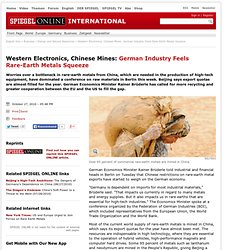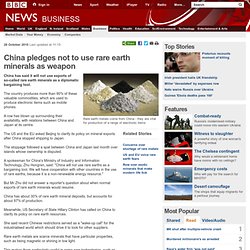

What are rare earth metals? "Rare earth" metals aren't as rare as they sound — in fact, you're probably using some right now.

They're key to a variety of everyday devices, from tablet computers and TVs to hybrid cars and wind turbines, so it may be encouraging to know several kinds are actually common. Cerium, for example, is the 25th most abundant element on Earth. So why are they called "rare" earths? The name alludes to their elusive nature, since the 17 elements rarely exist in pure form. Instead, they mix diffusely with other minerals underground, making them costly to extract. And, unfortunately, that isn't their only drawback. This wasn't a problem until recently, when China began tightening its grip on rare earths.
Many of China's customers are already shopping around: Deposits in Russia, Brazil, Australia and South Asia have drawn widespread interest, as has the only rare earths mine in the U.S. The newly reopened rare earths mine in Mountain Pass, Calif., pictured here in December 2010.
Rare earths row: some home truths. China mines over 95pc of the world's rare earth minerals If you haven’t heard of rare earth metals, then brace yourself – in the coming months you’ll be hearing a lot more about these 17 metals from the middle of the Periodic Table with unpronounceable names like lanthanum and neodymium.

They are sprinkled in a vast number of the things that make the modern world go round – from iPods to windturbines, electric car engines to flat-screen TVs and smart-bombs – and as such, they are vital to the global economy. The reason you’ll hear a lot about them is 1) because China currently controls 93-97 per cent of the world’s production of rare earth metals and 2) because China is enforcing strict new quotas on the exports of rare earths which is pushing up global prices sharply. This is a very complicated story which I’ve been researching in detail of late, so there are a few things worth bearing in mind amid the hype. 1) There isn’t a shortage of rare earths. 4) And that price could be high. Western Electronics, Chinese Mines: German Industry Feels Rare-Earth Metals Squeeze - SPIEGEL ONLINE - News - International. German Economics Minister Rainer Brüderle told industrial and financial heads in Berlin on Tuesday that Chinese restrictions on rare-earth metal exports have started to weigh on the German economy.

"Germany is dependent on imports for most industrial materials," Brüderle said. "That impacts us currently in regard to many metals and energy supplies. But it also impacts us in rare earths that are essential for high-tech industries. " The Economics Minister spoke at a conference organized by the Federation of German Industries (BDI), which included representatives from the European Union, the World Trade Organization and the World Bank. Most of the current world supply of rare-earth metals is mined in China, which says its export quotas for the year have almost been met. "Raw materials have become a geopolitical issue," said BDI chief Hans-Peter Keitel, who called for more political help with supply problems.
China pledges not to use rare earth minerals as weapon. 28 October 2010Last updated at 11:13 Rare earth metals come from China - they are vital for production of a range of electronic items China has said it will not use exports of so-called rare earth minerals as a diplomatic bargaining tool.

The country produces more than 90% of these valuable commodities, which are used to produce electronic items such as mobile phones. A row has blown up surrounding their availability, with relations between China and Japan at its centre. The US and the EU asked Beijing to clarify its policy on mineral exports after China stopped shipping to Japan. The stoppage followed a spat between China and Japan last month over islands whose ownership is disputed. A spokesman for China's Ministry of Industry and Information Technology, Zhu Hongren, said: "China will not use rare earths as a bargaining tool.